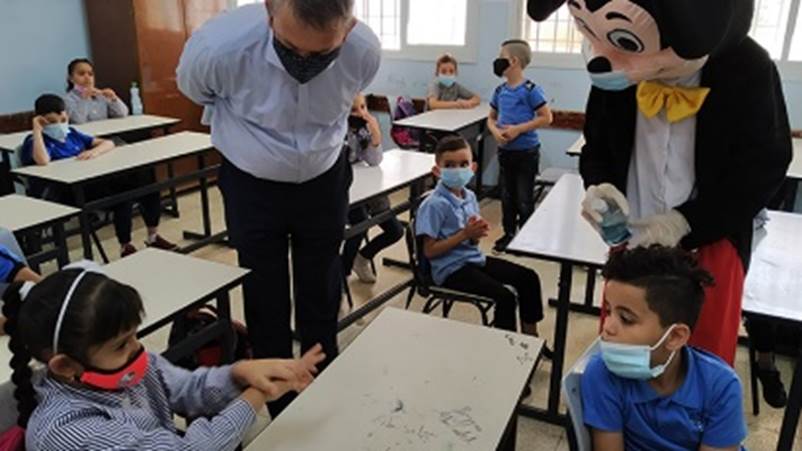The Commissioner-General of the United Nations Relief and Works Agency for Palestine Refugees in the Near East (UNRWA), Philippe Lazzarini, visited Aida and Dheisheh Palestine refugee camps in Bethlehem yesterday where he thanked the Agency’s frontline staff for their dedication during the COVID-19 pandemic and welcomed students “back to learning.”
“It is very refreshing to be around students in UNRWA schools in Bethlehem,” said Lazzarini while he was in the UNRWA Beit Jala Coeducational School near Aida refugee camp. “It’s almost like a sign of steadfastness in this city that had high numbers of COVID-19 cases early in the pandemic.” Lazzarini met with students who showed him the virus control measures implemented to protect the population.
Starting Sunday and continuing in the coming weeks, some 45,000 Palestine refugee students in the West Bank will have returned to learning after a six-month absence due to the coronavirus pandemic. They are among the more than 534,000 Palestine refugee students who are going back to learning in UNRWA-administered schools throughout the region between September and October.
Students in UNRWA schools in the West Bank attend classes in person three days a week and study remotely from home the other three days. This rotation allows for smaller-size classes that help uphold the requirement of physical distancing.
In Dheisheh camp the Commissioner-General met with frontline UNRWA staff, including doctors and nurses, sanitation laborers and social workers who continued their critical work throughout the pandemic, despite the lockdowns and the increased demand on their services. He thanked them for their courage and unwavering commitment to the wellbeing of Palestine refugees.
“UNRWA was able to continue all its services during lockdowns and closure thanks to the commitment of every single staff member,” said Lazzarini. “Sanitation laborers, construction workers, medical and education staff and so many more: you are the backbone of the Agency. I am very impressed with the quick way in which UNRWA services adapted to the immense health and safety challenges of COVID-19. This could not have happened without the dedication of my colleagues who work in the field and with the Palestine refugee community.”



